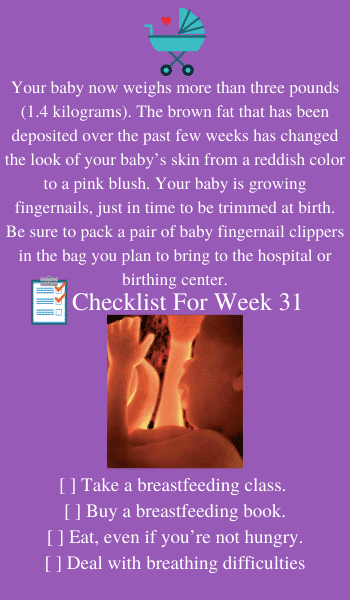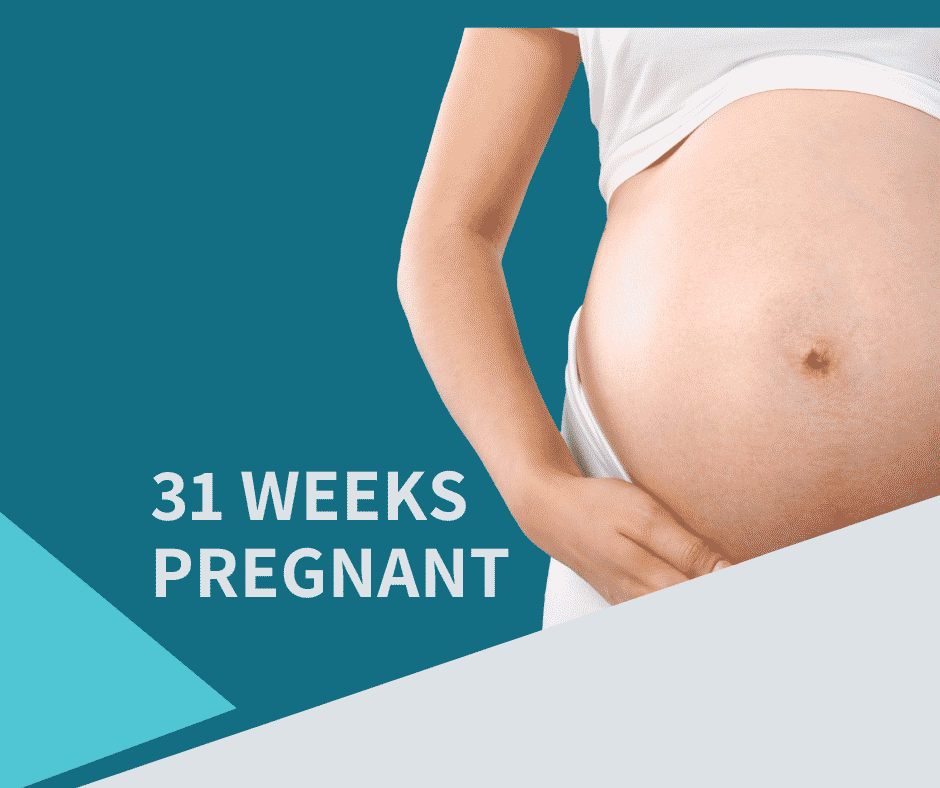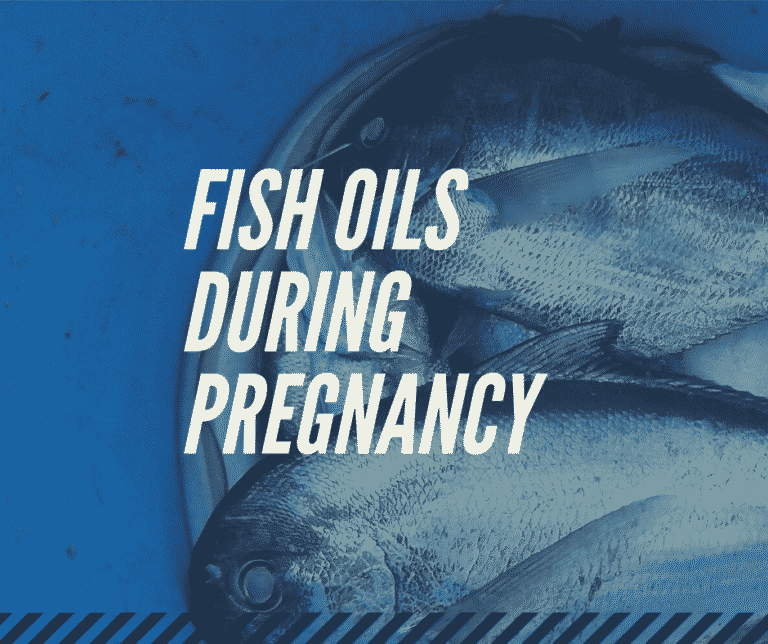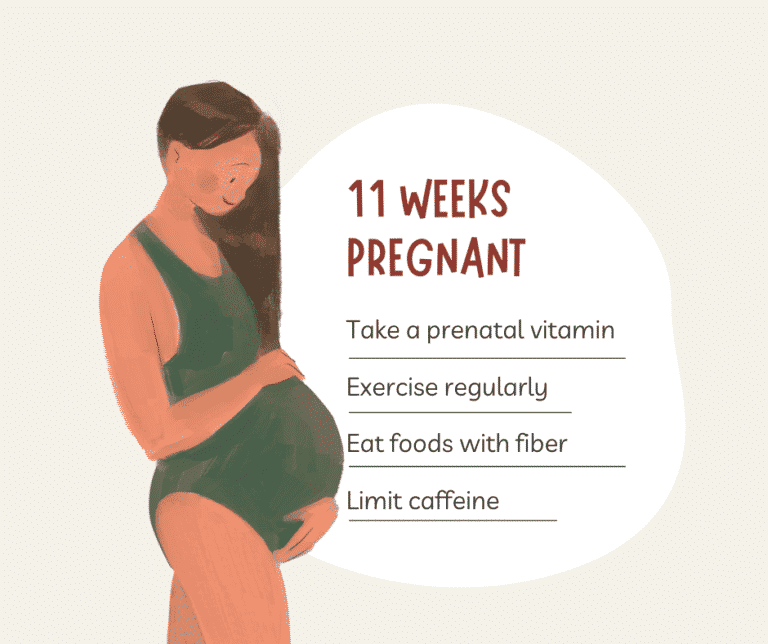31 Weeks Pregnant: Signs, Tips, Symptoms & Baby’s Development
Published on April 12, 2022 – Last Updated on October 18, 2022
As your due date nears, you’re likely feeling excited and anxious if you’re pregnant. However, as you get closer to your delivery date, it’s essential to know what to expect in the final weeks of your pregnancy. While you are at 31 weeks pregnant, we’ll discuss some common concerns and issues that may arise during this trimester of pregnancy. Keep in mind that every woman’s experience is different, so if you have any questions or concerns, be sure to speak with your doctor. Thanks for following along!
What to expect during the 31st week of pregnancy
During the 31st week of pregnancy, you can experience several changes and concerns, like sometimes contractions, Braxton Hicks contractions (Practice Contractions), and swelling. You may feel guilty or feel like you weight your shoulders during this time. You may also have nesting instincts, leading you to clean and organize your home in preparation for your baby’s arrival. As your due date approaches, keep up with your prenatal appointments and continue to take care of yourself. Read more on contractions: contraction app, contraction counter & how to track contractions.
If you want to find out more about the current stage of pregnancy and trimester, please view our posts about: how to calculate my due date and pregnancy week by week.

Symptoms you may experience at 31 weeks pregnant
As you reach the 31st week of your pregnancy, you may notice some new and continuing symptoms. These may include the following:
- Tiredness
- Shortness of Breath
- Heartburn
- breathlessness.
- Frequent urination.
- Leaky breasts.
- Leg cramps and/or back pain.
- Hemorrhoids.
- Constipation.
Tiredness:
You may feel more tired than usual as your body works harder to support your growing baby. Be sure to get plenty of rest and drink plenty of fluids.
Shortness of breath:
You may find it harder to breathe as your uterus pressure your lungs. This is normal and should improve after delivery.
Heartburn:
Many women experience heartburn during pregnancy, often due to the increased production of progesterone.
Breathlessness
This is normal due to the pregnancy hormone progesterone, which relaxes smooth muscle tissue throughout your body, including your bronchial tubes. Unfortunately, this can make breathing more difficult.
Frequent urination:
As your baby grows, they will pressure your bladder, causing you to feel the need to urinate more often.
Leaky breasts:
Many women experience a discharge from their breasts called colostrum in the final weeks of pregnancy. Colostrum is the precursor to breast milk and is thin and watery. Therefore, it is usual that your breasts leak colostrum even if you are not breastfeeding. (If so, try tucking some nursing pads into your bra to protect your clothes.)
Leg cramps and/or back pain:
These are common complaints during pregnancy and can be caused by several things, such as the weight of your uterus, edema, or constipation.
Hemorrhoids:
Hemorrhoids are swollen veins in your rectum and anus that may become inflamed and itchy during pregnancy. Unfortunately, there is not much you can do to prevent them, but using a hemorrhoid cream or suppository may help relieve symptoms.
Constipation:
Constipation is also common during pregnancy and can be caused by several things, such as the increased production of progesterone (pregnancy hormones), which relaxes smooth muscle tissue throughout your body, including your bowels. You may find relief from constipation by drinking plenty of fluids, eating high-fiber foods, and exercising regularly.
You can ameliorate your symptoms with pregnancy affirmations, birth affirmations, and hypnobirthing affirmations.
31 Weeks Fetus
31 weeks into development, the fetus is approximately 16 to 17 inches long and weighs around 4 pounds. At this stage in pregnancy, the mother may begin to feel Braxton Hicks contractions, which are irregular and brief contractions of the uterus that can last anywhere from a few seconds to a few minutes. These contractions are normal and help the mother’s body to prepare for labor. The baby’s lungs continue to develop and mature, and the digestive system begins to function.
The 31-week-old fetus grows rapidly and will continue to do so until birth. Although the 31-week fetus is still considered premature, with proper medical care, most babies born at this gestational age survive and go on to lead healthy lives.
31 Weeks Belly
Pregnancy is a fantastic time for a woman’s body. Over nine months, the body undergoes tremendous changes to accommodate a growing baby. One of the most noticeable changes is the expansion of the belly. For many women, this can be a source of pride and satisfaction, as it is a physical representation of the life they are creating. However, for some women, the 31 weeks belly can be a source of anxiety and insecurity.
There is no right or wrong way to feel about a 31 weeks belly. Some women love how their bodies look and feel during pregnancy, while others may feel self-conscious or uncomfortable. The important thing is to listen to your own body and do what feels right for you. If you’re unhappy with your 31 weeks belly, there are things you can do to help improve your self-image and confidence.
Talk to your doctor or a therapist about your feelings, wear clothes that make you feel good, and focus on the positive aspects of pregnancy. Remember that your 31 weeks belly is only temporary and that you will soon be holding your beautiful new baby in your arms.
Changes your body is going through at 31 weeks pregnant
You’re 31 weeks pregnant, and you may be noticing some changes in your body. For example, at this stage in the game, most women will start seeing red streaks on their skin from blood vessel growth or fat deposits called Violaceous Mucin Production (VMP).
Additionally, you may also notice an increase in the size of your uterus and greater feelings of fatigue. During this time, you may feel an increase in your breast size and tenderness, and you may also find that you have to go to the bathroom more frequently.
You feel lazy and tired; also, you will gain weight during this pregnancy period. So, it’s better to do light exercises. Your skin stretches through, and most women feel comfortable after this.
You may have gained around 10-15 pounds by now. However, if you’re carrying twins or multiples, you may have gained more weight. It’s important to eat healthily and stay active, but don’t try to diet or lose weight during pregnancy.
Fetal development during week 31 of pregnancy
This week your baby is making many changes, including the loss of lanugo hair. The eyes can now focus, and reflexes may be present in addition to thumb-sucking becoming more prevalent as well! Also, by this point, babies’ lungs are fully developed while their nervous system has been going strong since midweek on its own accord– he is safe in the amniotic fluid and without any help from parents or caregivers at all really (which we know isn’t valid for everyone).
Baby’s Size:
At 31 weeks pregnant, your baby is about the size of a honeydew melon.
Baby’s Weight:
The average baby weighs about 3 pounds at 31 weeks pregnant.
Baby’s brain:
Babies’ brains are growing at a fantastic rate during the third trimester. By the end of this week, your baby’s brain will be about the size of a small grape.
Baby’s Structure:
All of your baby’s organs are present and developed by this week. However, they’re not fully matured yet. For example, your baby’s lungs are still growing and won’t be ready to breathe air until after delivery.
Overall Baby’s Development:
Your baby is around 15.6 inches long this week and weighs about 3 pounds. They are starting to look more like a newborn, with more clearly defined features. Baby’s eyes can now open and close, and they may begin to practice sucking and breathing.
Tips for Healthy Pregnancy at 31 weeks pregnant
During this week, you should also arrange to take your maternity leave. For a healthy pregnancy, You have to keep these tips in mind:
- Make sure you’re getting enough sleep.
- Eat a balanced diet.
- Stay active.
- Be sure you empty your bladder completely.
- Drink at least eight glasses of fluid a day.
- Use Kegel exercises
- Wear panty liners
Make sure you’re getting enough sleep.
As your pregnancy progresses, you may become more and more tired. This is normal, and it’s essential to get as much sleep as possible. During the last few weeks of your pregnancy, aim for at least 8 hours of sleep each night.
Eat a balanced diet.
A healthy diet is vital for both you and your baby. Be sure to eat plenty of fruits, vegetables, whole grains, and lean protein.
Stay active.
Staying active during pregnancy is good for you and your baby. Walking and gentle stretching are all great exercises to do during pregnancy.
Be sure you empty your bladder completely.
When you go to the bathroom, be sure to empty your bladder completely. This will help prevent urinary tract infections.
Drink at least eight glasses of fluid a day.
It’s essential to stay hydrated during pregnancy. Aim for at least eight glasses of fluids each day, including water, juice, and milk. Avoid caffeine and sugary drinks.
Use Kegel exercises
Kegel exercises help strengthen your pelvic floor muscles. These muscles support your uterus and help control your bladder. Doing Kegel exercises can help you during pregnancy and after childbirth.
To do a Kegel exercise, squeeze the muscles you would use to stop urine flow. Hold this squeeze for 5 seconds, then relax for 5 seconds. Repeat this ten times. Do this exercise 3 times a day.
Wear panty liners
During the last few weeks of pregnancy, you may notice an increase in vaginal discharge. This is normal and is caused by your body’s changing hormone levels. Wear a panty liner or maternity underwear to keep yourself clean and comfortable.
As your due date approaches, it’s essential to be aware of the common concerns and issues during the 31st week of pregnancy.
Tips For partners at 31 weeks pregnant
Partners of pregnant women often have questions about what they can do to help out and support their partners. Here are a few tips:
- Be supportive and understanding. Pregnancy can be difficult for some women, and your partner may need your support more than ever. Be patient and listen to her concerns.
- Help with household chores. Pregnancy can be exhausting, so offer to help with household chores and errands. This will give your partner some much-needed rest.
- Attend prenatal appointments. It can be helpful for partners to attend prenatal meetings with their pregnant partners. This way, you can ask the doctor any questions you have and get more information about the pregnancy.
- Provide emotional support. Pregnancy can be an emotional time, so be there for your partner when she needs it. Offer words of encouragement and be a source of comfort.
Doctor Visit
You’re probably feeling a bit more uncomfortable now as your pregnancy progresses. You may have back pain, leg cramps, and trouble sleeping. This is all normal! To get reasonable disease control, talk with your doctor & will likely check on the baby’s growth and position during this visit. You may also have a non-stress test (NST) to check the baby’s heart rate and wellbeing.
FAQs
Is the baby fully developed at 31 weeks?
Most babies born between 31-and 32 weeks are considered full-term and healthy early labor. At this stage in development, the baby’s brain and lungs are fully formed, ready to be born. However, your baby may still experience minor health concerns, such as jaundice or low blood sugar.
What should I expect in the 31st pregnancy week?
You may feel more tired and uncomfortable by this stage in your pregnancy than ever. You may also be experiencing common symptoms like Braxton Hicks contractions, swollen feet and ankles, and constipation. So in the final weeks of pregnancy and get plenty of rest.
What are the risks during the 31st week of pregnancy?
There are a few risks to be aware of during the 31st week of pregnancy & before the baby arrives. These include preterm labor, placental abruption, and preeclampsia. If you experience any of these symptoms, call your doctor right away.
Other Pregnancy Weeks:
- 1 Week Pregnant
- 2 Weeks Pregnant
- 3 Weeks Pregnant
- 4 Weeks Pregnant
- 5 Weeks Pregnant
- 6 Weeks Pregnant
- 7 Weeks Pregnant
- 8 Weeks Pregnant
- 9 Weeks Pregnant
- 10 Weeks Pregnant
- 11 Weeks Pregnant
- 12 Weeks Pregnant
- 13 Weeks Pregnant
- 14 Weeks Pregnant
- 15 Weeks Pregnant
- 16 Weeks Pregnant
- 17 Weeks Pregnant
- 18 Weeks Pregnant
- 19 Weeks Pregnant
- 20 Weeks Pregnant
- 21 Weeks Pregnant
- 22 Weeks Pregnant
- 23 Weeks Pregnant
- 24 Weeks Pregnant
- 25 Weeks Pregnant
- 26 Weeks Pregnant
- 27 Weeks Pregnant
- 28 Weeks Pregnant
- 29 Weeks Pregnant
- 30 Weeks Pregnant
- 32 Weeks Pregnant
- 33 Weeks Pregnant
- 34 Weeks Pregnant
- 35 Weeks Pregnant
- 36 Weeks Pregnant
- 37 Weeks Pregnant
- 38 Weeks Pregnant
- 39 Weeks Pregnant
- 40 Weeks Pregnant
- Birth Plan
- Baby Due Date Calculator
- EDD Calculation
- how many weeks pregnant I am







